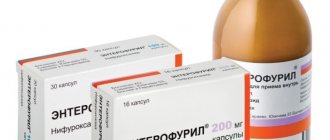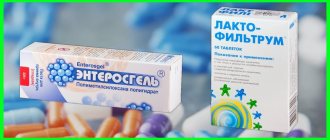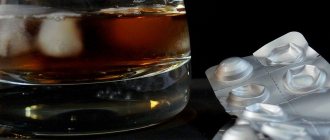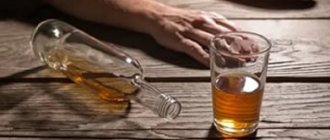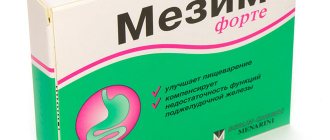Home page » Alcohol and drugs $image_url = https://stopalkogolizm.ru/wp-content/uploads/2017/09/laktofiltrum-i-alkogol.jpg (votes: 2)
Problems with the stomach and intestines are common in both children and adults. Even if a person chooses foods carefully, this does not mean that he will not experience stomach pain and other related symptoms. This question is especially relevant for lovers of exotic foods and people suffering from a hangover. Mild poisoning can be cured at home. You can get rid of the symptoms of poisoning and restore the gastrointestinal tract using appropriate means. Lactofiltrum is one of the best drugs that help eliminate the symptoms of poisoning.
Compatibility of Lactofiltrum and alcohol
Lactofiltrum is a combination drug with a pronounced detoxifying effect. Its active composition is represented by lactulose and lignin.
Substances of organic origin are used to eliminate all signs of general intoxication of the body. Including symptoms of alcohol poisoning. Taking it with alcoholic drinks not only does not harm health, but is also very useful.
Improvement in well-being occurs when the dosage regimen is followed. When using a medicine in large quantities, the risk of developing adverse reactions increases.
Deliberately increasing dosages to speed up recovery will have the opposite effect. It is possible that the beneficial properties of other drugs for the treatment of alcoholism or hangover may be weakened.
Take the Attention Test! Find 10 differences! (click right here!)
Side effects
Lactofiltrum is a fairly safe product. When used correctly, it does not cause side effects.
If the dosage is exceeded, the drug provokes:
- indigestion, which is accompanied by flatulence;
- constipation;
- feeling of heaviness.
If the medicine is used for more than 21 days, the patient may experience vitamin deficiency. The sorbent provokes a deficiency of vitamins from group B. Often, due to improper use of the medicine, the patient is diagnosed with calcium deficiency.
If the symptoms described above appear, the drug should be discontinued.
Self-medication is dangerous for humans. Therefore, with the development of side effects, it is necessary to consult a doctor. Otherwise, the patient may face new complications.
Brief characteristics of the drug
The drug is prescribed to patients when diagnosing intestinal infections, diarrhea, dysbacteriosis, purulent-septic pathologies, allergic reactions, and chronic renal failure. It is indicated for alcohol poisoning and alcohol withdrawal.
The drug is characterized by various pharmacological properties:
- enhances the production of folic acid, vitamins H and K, necessary for the proper functioning of the cardiovascular, central and peripheral nervous systems;
- increases a person’s immunity to the action of external and internal factors;
- binds toxic substances on its surface and is then evacuated with them unchanged.
Lignin is a powerful adsorbent that cleanses the body of alcohol breakdown products. And lactulose serves as a nutrient medium for strains of beneficial bacteria that live in the intestines.
Due to an increase in their population, the number of opportunistic microorganisms decreases. Restoration of intestinal microflora is always required after alcohol abuse.
https://myweak.ru/alkogolizm/lekarstva/laktofiltrum-sovmestimost.html
Prevention of nosocomial infection
During long-term treatment in a hospital, the patient’s immunity becomes vulnerable to the microflora living in medical institutions. Such microorganisms have developed a defense mechanism against antibiotics and antiseptics, so they are difficult to treat.
Germs, such as Pseudomonas aeruginosa, hinder recovery and may themselves pose a health threat. During long-term treatment in a hospital setting, lactofiltrum is prescribed to stimulate the growth of intestinal symbiont bacteria. This creates a natural barrier for Pseudomonas aeruginosa.
Use of the drug for alcoholism
Regular and long-term consumption of alcohol reduces the functional activity of all vital systems. But the gastrointestinal tract especially suffers due to ulceration of its mucous membranes.
In a patient with chronic alcoholism, peristalsis is periodically disrupted, and putrefactive and fermentative processes develop. The drug is used to restore the functioning of the digestive system.
At the initial stage of treatment, alcohol metabolites are removed from the bloodstream using parenteral administration of saline solutions and glucose. And lignin from the composition additionally cleanses the gastrointestinal tract of them. Lactulose eliminates the negative consequences of drinking alcohol in the form of severe dysbacteriosis.
Increasing the number of bifidobacteria in the intestines helps to stop low-grade inflammation and eliminate excess gas formation.
Recovery from alcohol poisoning
Thanks to the drug, the likelihood of dehydration is eliminated, the process of removing toxins is accelerated, which contributes to rapid rehabilitation. But it is advisable to follow a few rules:
- Half the daily amount of tablets should be taken before the feast.
- The rest before going to sleep.
In the morning, it is advisable to take another dose even in the absence of obvious signs of intoxication. Otherwise, by the evening the condition may seriously worsen.
For chronic alcoholism, you can use Lactofiltrum, but in combination with other drugs.
Using the drug for a hangover
The drug is considered an effective remedy for eliminating hangover symptoms. It is taken orally, 3 tablets, with a sufficient amount of water an hour before meals.
In a hangover, a person suffers from bouts of nausea, often ending in vomiting. In such cases, it is advisable to take the medicine after cleansing the stomach with a slightly pink solution of potassium permanganate.
During a hangover, the adsorption effect is in demand. Lignin binds the toxic metabolite of ethanol acetaldehyde and fusel oils, removing them with each bowel movement. Lactulose has a weak laxative effect, so there are no problems with bowel movements.
Consequences of drinking alcohol
Indicated for the treatment of alcohol intoxication, but not for its prevention. Combining ethanol and the ingredients of the drug eliminates all the beneficial properties of the latter. Part of the lactulose will be destroyed, and its physicochemical properties will change.
If the intestinal microflora is restored, it will be to an insufficient extent for a person’s recovery. In the morning, the consequences in the form of bloating, seething and rumbling in the stomach will not keep you waiting.
But there are also compatibility features. Lignin neutralizes ethanol and prevents a person from getting drunk quickly. For this purpose, taking the drug is permissible in a dosage of 2-3 tablets.
Indications for use
Lactofiltrum has a wide spectrum of action and is prescribed in the following cases:
- For alcohol intoxication, when you need to quickly remove toxic compounds from the body and eliminate all the negative symptoms of a hangover.
- In case of chemical, food or drug poisoning.
- For viral or bacterial diseases of the stomach, when it is necessary to destroy pathogenic microflora and restore the balance of beneficial bacteria.
- For functional digestive disorders.
- During complex treatment of stomach pathologies, when unpleasant symptoms such as bloating, diarrhea, constipation, and flatulence are observed.
The drug contains safe components, so it is allowed from the first year of a baby’s life.
Organs affected by the toxin
The combined use of pharmacological agents and alcohol has a toxic effect on the internal organs and environments of the body. Alcohol, entering into a chemical reaction with a medicine, leads to poisoning, disrupts physiological processes, enhances or weakens the healing properties of drugs.
The liver suffers more than other organs. She gets hit twice. Many medications have a side effect - hepatotoxicity, destroy cells, and disrupt the physiology of the organ. In the liver, alcohol breaks down to ethanal, a substance 20-30 times more toxic than ethanol, which causes the death of hepatocytes.
Dangerous groups of drugs for the organ in combination with alcohol:
- anti-inflammatory;
- hormonal;
- antibacterial;
- antifungal;
- glucose control agents for diabetes mellitus;
- anti-tuberculosis;
- cytostatics (chemotherapy drugs);
- tranquilizers (anti-epileptic, psychotropic).
In second place among the internal organs exposed to the harmful effects of alcohol together with medications are the heart and vascular system. Strong drinks during drug therapy constrict blood vessels and increase blood pressure. The simultaneous intake of alcohol and chemical substances leads to failure of the myocardium and increases the risk of developing an attack of angina pectoris and a heart attack.
A mixture of ethanol and pharmaceuticals disrupts the quality of the blood and reduces clotting. This is dangerous due to internal bleeding and strokes.
Rules for taking medications and alcohol
Drinking alcohol during treatment minimizes the clinical effect of therapy and creates a risk of developing complications of the disease.
If this cannot be avoided, follow the rules of behavior that will reduce the occurrence of negative consequences:
- Do not drink strong drinks (vodka, cognac, whiskey), choose dry wine (100-150 ml), beer (no more than 300 ml). Don't drink alcohol on an empty stomach.
- The interval between taking the medicine and alcohol should be at least 2 hours.
- To reduce the toxic effect, take medications that protect the liver (hepatoprotectors), pancreas (pancreatin), and stomach (antacids ─ Rennie, Almagel).
If a person takes antiviral medications for colds, anti-inflammatory drugs, alcohol in moderation does not pose a threat to the body.
Alcoholic drinks during treatment are strictly contraindicated in cases of liver cirrhosis, severe infectious diseases, and during a course of chemotherapy.
As a remedy for acne
As a rule, doctors recommend taking pills until the symptoms of intoxication completely disappear. Usually five days after taking the pills, you feel better. With long-term use, it is necessary to take an additional course of vitamins.
The compatibility of Lactofiltrum and alcohol is such that during a course of treatment with the medication, such drinks can be consumed in small volumes. The medicine can be taken before a feast or in the presence of a hangover. This will help relieve symptoms:
- dehydration;
- tremors of the hands or feet;
- increased heartbeat.
For the greatest effect, it is recommended to take enterosorbent both before and after drinking alcohol-containing drinks. In this case, the positive effect will be maximum.
For what diseases is Lactofiltrum prescribed?
[ads-pc-2]
Lactofiltrum is not used, there is:
- intestinal obstruction
- bleeding from the digestive tract
- galactosemia
- hypersensitivity to some components
If a person has a stomach or duodenal ulcer in an acute stage, and also has gastric atony, then taking the drug must be treated with extreme caution.
As mentioned above, the drug has a binding and enterosorbing effect. Naturally, this is not directly related to the treatment of acne. But if acne appears as a result of intestinal problems, the drug can have a positive effect on the skin by removing toxins and waste from the body. This will reduce the number of skin rashes.
Medicines, alcohol and chronic diseases
If a person has chronic diseases, simultaneous use of alcohol and medications is potentially dangerous for the functioning of vital organs. Since patients systematically take prescribed medications, the influence of alcohol can lead to negative consequences.
People with chronic heart disease (angina pectoris, heart defects) develop arrhythmias of varying severity. Heart attacks with severe pain syndrome develop, which is not relieved by Nitroglycerin, and the risk of developing myocardial infarction increases significantly.
In case of chronic liver diseases (viral hepatitis, hepatosis), alcohol during treatment can become a trigger in the development of cirrhosis and hepatocellular carcinoma (cancer).
Drinking alcohol during cirrhosis leads to the following consequences:
- bleeding into the abdominal cavity;
- liver decomposition, infection, peritonitis;
- hepatic coma;
- death.
If a person is on long-term treatment with sedatives, psychotropic drugs, tranquilizers, he is contraindicated in drinking alcohol. This leads to severe depression and the appearance of obsessive states (hallucinations, phobias). Suicidal feelings develop. Such a patient needs constant monitoring and assistance from a psychiatrist.
The most dangerous combinations and consequences
The combination of alcohol and chemical-based drugs can lead to serious disorders in the body, and in some cases to fatal consequences.
List of medications and their side effects in combination with alcohol:
| Name of group, drug | Negative results of interaction |
| Neuroleptics (tranquilizers, anticonvulsants, hypnotics) | Severe intoxication, up to cerebral coma |
| CNS stimulants (Theophedrine, Ephedrine, Caffeine) | Rapid increase in blood pressure, hypertensive crisis |
| Antihypertensives (Captofrin, Enalapril, Enap-N), diuretics (Indapamide, Furosemide) | Sudden drop in pressure, collapse |
| Analgesics, anti-inflammatory | Increased toxic substances in the blood, general poisoning of the body |
| Acetylsalicylic acid (Aspirin) | Acute gastritis, perforation of gastric ulcer and 12-PC |
| Paracetamol | Toxic liver damage |
| Hypoglycemic (Glibenclamide, Glipizide, Metformin, Phenformin), insulin | A sharp decrease in blood sugar levels, hypoglycemic coma |
